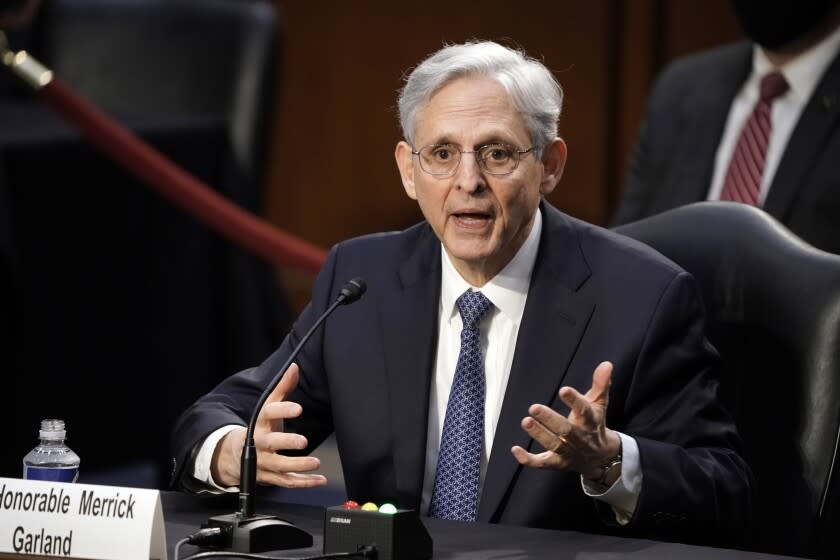Congress members blast proposed Discovery-WarnerMedia merger

- Oops!Something went wrong.Please try again later.
More than 30 Democratic members of Congress are raising concerns about cable programming giant Discovery's proposed $43-billion takeover of WarnerMedia, owner of CNN, HBO, Cartoon Network and the Warner Bros. television and film studio.
In a letter Monday to U.S. Atty. Gen. Merrick Garland and Assistant Atty. Gen. Jonathan Kanter, the lawmakers said the proposed consolidation "raises significant antitrust concerns" and warranted increased scrutiny from the U.S. Department of Justice's antitrust division, which Kanter now heads.
Discovery is seeking to absorb WarnerMedia from telecommunications colossus AT&T, which bought the WarnerMedia assets 3½ years ago after a protracted battle with the Justice Department. The Discovery-WarnerMedia merger was announced in May and, until now, has encountered little turbulence as it has wended its way through the antitrust review process.
Monday's letter represents the first major pushback against the deal in the U.S.
"The merger threatens to enhance the market power of the combined firm and substantially lessen competition in the media and entertainment industry, harming both consumers and American workers," according to the letter, which was drafted primarily by four lawmakers — Rep. Joaquin Castro (D-Texas), Rep. David N. Cicilline (D-R.I.), Sen. Elizabeth Warren (D-Mass.) and Rep. Pramila Jayapal (D-Wash.).
Nearly 30 other members of Congress signed on to the letter, including Rep. Alexandria Ocasio-Cortez (D-N.Y.), Rep. Jamie Raskin (D-Md.), Rep. Zoe Lofgren (D-San Jose) and Rep. Ted W. Lieu (D-Torrance).
WarnerMedia and Discovery Chief Executive David Zaslav have previously argued the deal is not anti-competitive. They have noted that Discovery is much smaller than WarnerMedia and will not reduce the number of Hollywood studios because Discovery does not own its own movie studio or a major TV studio that focuses on scripted content. Discovery owns such channels as Animal Planet, Investigation Discovery, TLC, Food Network and the popular HGTV. (Discovery declined to comment.)
In addition, Discovery has long focused on lower-budget "nonfiction programming," in contrast to HBO and Warner Bros., which have produced such big-budget franchises as "Game of Thrones," "Wonder Woman," "Godzilla vs. Kong," "The Big Bang Theory" and the Harry Potter movies.
The move comes as the Justice Department has been taking a close look at the market power of technology and social media companies, including Facebook, Amazon and Google. The Justice Department separately is reviewing Amazon's proposed $8.45-billion takeover of the legendary MGM entertainment studio, home of the James Bond and Rocky film franchises.
Just last month, the Justice Department sued to block a proposed consolidation in the book world — the $2.2-billion takeover of ViacomCBS' Simon & Schuster publishing house by German media giant Bertelsmann’s Penguin Random House. That deal would shrink the number of major American publishing houses to four from five.
Castro, in particular, is concerned about how the Discovery-WarnerMedia union might further restrict media opportunities for Latinos.
"The media and entertainment industry already suffers from a lack of Hispanic representation in its workforce," the letter noted.
In September, the Government Accountability Office reported that, in the media and entertainment sector, a "remarkably low number of professional, management, and executive roles" are filled by Latinos, according to the letter.
"Economic justice cannot be realized without ensuring that all communities — especially low income and minority communities — are protected from the exploitation and abuse that often accompanies concentrated economic power," the letter said.
In an interview Monday, Castro said the entertainment industry has a poor track record of advancing the work of people of color, not only in executive suites of media companies but also among the ranks of actors, directors and other creative talent who make shows.
"The media and entertainment industry has been way too exclusive for too long and it has hurt consumers, workers and content creators," Castro said. "A merger of this size would have the potential to further concentrate the exclusion of certain groups of people."
The lawmakers also said that post-merger companies have later abandoned their promises to deliver value to consumers.
"Finally, recent consolidation in the media and entertainment marketplace has led to higher prices for consumers, and all too often the merging parties have failed to deliver benefits and broken promises made to the public, to Congress, and to antitrust enforcers," they wrote.
This story originally appeared in Los Angeles Times.

